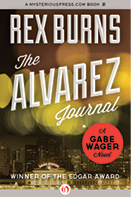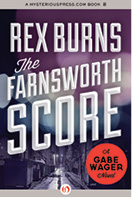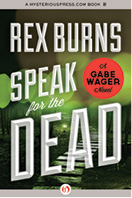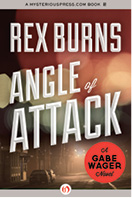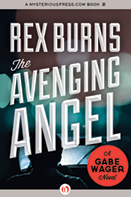Endangered Species (36 page)
Read Endangered Species Online
Authors: Rex Burns

Overcoming that kind of attitude would be helped by having a black homicide detective. But one hadn’t yet moved up to take the place of Armstrong, who had left almost a year ago to join the Portland, Oregon, PD. That left Wager and others relying on people like Sergeant Blainey, himself an African-American and resident of District Two. So Wager telephoned the dispatcher and set up a meet with the patrolman. Then he pushed his name across the location board to the On Patrol column and took the elevator down to the chill, stale air of the basement garage.
If Blainey had changed at all in the years Wager had known the man, it was only to get a larger neck size. His face, round as a pumpkin, glistened with perspiration as it did summer and winter, and the same frown of concentration wrinkled the dark flesh between his eyebrows. “We use to have our gangs, too, Gabe. I recollect a few good fights with some of you west side Chicanos—hell, high school football games, that was the time for mixing things up a little back of the stands, you know?”
Wager nodded as if he remembered jolly high school fights, and picked at the nutty bumps under the opaque glaze of his donut. He wasn’t quite sure what they were, and he hadn’t really wanted to order anything, but Blainey—who seemed to eat whenever he got out of his cruiser—had urged it on Wager. It was, he said, a gift of the diner’s owner, who liked to have uniformed cops stop by; he was about the only one along this stretch of East 26th who hadn’t been robbed, and he figured it was because the hoods weren’t sure when a cop would be sitting here. “I ain’t about to tell him it’s because he don’t have nothing worth robbing.” Blainey grinned, the silver of a repaired molar glinting far back in his mouth. “He wouldn’t believe me. But then the robbers wouldn’t neither, so maybe he’s right.”
“Have you heard anything more about Hocks?”
“Heard he been seen hanging around Big Ron. Which I guess makes him dumber than Ron is.”
“A wannabe Blood? That’s definite?”
Blainey nodded. “Little girl my youngest daughter goes to Sunday school with told her. I talked to her and she swears it’s true. Saw Hocks and Big Ron sitting over in Morrison Park. Says they looked like they be talking a little business. She described both of them good—knows them both too. And got no reason to lie.” Blainey added, “That little girl’s only ten years old, Gabe. Already knows a dope deal when she sees one going down. Swear to God, you’d think we lived in Washington, DC, or Detroit or one of them hellholes.”
Big Ron Tipton was one of those names that had been around the District Two station so long that it seemed like it was on the duty roster. He was still in his twenties, but, including his juvenile record, he had at least two decades of contact cards in his file. The last Wager had heard was that the man was a Blood associate as well as a small-time crack peddler. Big and dumb—mentally handicapped in some way—he was supposed to be working his way toward the inner ring of longtime members who made up the core of most established gangs. Norm Fullerton, who gave briefings to the police divisions on the latest gang profile, had said that the black gangs usually weren’t as organized as the white ones. Those tended to have presidents and vice-presidents, treasurers and enforcers, as well as the emblems and paraphernalia of rank and formal structure. The black gangs, though they were more fluid, often had core OG’s—“Old Gangsters”—with ties to the original LA organizations and who gave continuity and whatever direction the local bunch might want. The OG’s tended to be in their thirties, some pushing forty, and, having proved all they needed to prove, kept a low profile because another fall could send them up for life. “Big Ron’s into crack, isn’t he?”
“He deals some, yeah, but what I heard, he likes to work alone. Don’t like sharing, you know? Every payday weekend’s Christmas for him.” The officer drained his coffee cup. “Shows to go, you don’t got to be smart to get rich with that crap.”
Which was the real problem, and made Wager occasionally consider the benefits of drug legalization. But it wouldn’t happen—too many people made too much money from keeping it illegal. “If Hocks was really working for him, was he maybe trying to push crack in someone else’s territory?” Which could mean that John Erle would be just the first victim in a possible gang war. There were always squabbles and fights among members who needed to show heart, but Denver, unlike some eastern cities, hadn’t yet suffered a major war over trading territory. Still, it could come. Like the flu, it was bound to arrive someday.
“I ain’t heard nothing about that, but he could’ve been.” Blainey’s head wagged. “Maybe Big Ron wants to be bigger; it does happen.” He finished his sweetroll and coffee. “But if that’s the case, Gabe, they gonna be some bad shit flying around, because Big Ron, he might be hungry enough to try but he’s too dumb to get.” He frowned and scrubbed with a paper napkin at the mustache over his heavy lips. “I sure hope that ain’t what’s happening. I hear anything else, I let you know. You going to talk to Big Ron?”
“Yeah.”
“Want me with you?”
Wager shook his head. “Won’t make any difference. If he wants me to know something, he’ll tell me; if not, he won’t. And there’s no sense letting him guess where I got his name.” Wager added, “He’s not the brightest guy in the world, but he’s one of the meanest I’ve run across.”
“Ain’t that the truth. You know what he told me once?”
“What’s that?”
“Say he love his mama, but he love his Bloods more—they his real family.”
And that, for Wager, was why there would always be gangs: because people who were too weak or too dumb to stand alone needed other people around who could make them feel strong and smart.
It was midmorning, and that meant Big Ron Tipton was probably still asleep; Wager pulled to the curb in front of the bungalow and crossed the tiny patch of front yard. What was left of the walk sheltered a few sprigs of grass around the broken concrete slabs, but the rest was gray dirt packed hard and bare by feet and neglect. The home was like a lot Wager had visited over the years, built in the 1930s, a main floor with another couple of rooms jammed under the hipped roof, a basement that might or might not have been finished. Probably wasn’t, but could have had someone living there just the same. The roof over the front porch was held up by four pillars whose lower halves were yellow brick and whose upper halves were square wooden posts that tapered slightly and still had a few patches of brittle white paint left on them. Three wooden chairs with well-worn cushions filled the space to one side of the door; the other side was empty of everything except a scattering of cigarette butts, scraps of paper trash, an empty beer bottle on its side. Molson. Big Ron had moved up from Rolling Rock. Getting to be a real yuppie. Wager knocked and waited, knocked again.
Finally the slap of loose slippers sounded on bare boards, and a woman, almost as tall as Wager but twice as wide, appeared in the darkness behind the rusty screen. “What you want?”
“Good morning, Ms. Tipton.” Wager flipped his badge case open and shut over his forefinger and tucked it back into his shirt pocket. She knew him and he knew her, but the law required an officer to identify himself. “Need to talk to Big Ron. How about waking him up for me?”
“Maybe he need his sleep more’n he need your talk, Detective Wager.”
She always made his name sound like something you scraped off your shoe. But that was fine with Wager; he didn’t like thinking that any of these people might believe they were friends of his. “Just trying to save your little boy a trip downtown, Ms. Tipton. Less trouble all around if we can just talk here and get it over with.”
The woman made a grunting noise and disappeared, the slapping sound sharper. She received her welfare, being a poor widow and all, but her real income was a big slice of her son’s dope money, which she wasn’t wasting on fixing up their house any. Aside from the brand-new Coupe DeVille sitting in the rattrap of a garage behind the bungalow, they didn’t spend it on much else, either. Man who cleared a couple thousand tax-free dollars on a payday weekend must have a big pile of cash stuck away somewhere.
“Mama say you want to talk to me.” He had come to the door quietly in his stocking feet, wearing baggy drawers and a tank-top undershirt stretched almost transparent across his chest and stomach. There was muscle beneath the fat, and a lot of both, and he had to hunch a bit to fit under the lintel and glare out. “About what?”
“The late departed John Erle Hocks. He was doing a little work for you, right? I want to know if that’s what got him scrubbed.”
“The shit you talking about?” The bloodshot, wet-looking eyes staring at Wager bulged with the effort of the mind behind them. “Who say he working for me? Doing what?”
“Selling crack, Ron. It’s no secret, and I don’t care what you do to stay off the dole. I just want a lead on who shot John Erle.”
The eyes blinked. “Wasn’t me.”
“That’s good. I’m real glad to have your word on that, Ron.” Wager smiled up into the wide, sullen face behind the screen. “Who did do it?”
“I don’t know.”
“But you’ve got some ideas. Give me some names I can talk to and I’ll leave you alone.”
“He say he don’t know who, Detective Wager. He say it, he mean it.”
“Yes, ma’am, and I believe him, too. But a smart boy like him, keeps his ears open, hears things—I bet he’s got some ideas about who killed his man.”
“We take care of it; that’s my idea!”
“Shut up, fool!”
“Mama—”
“I tell you hush!” The woman’s angry face shoved in beside one of Ron’s biceps. “He say he don’t know. Now that’s it—you get on. You leave my boy be!”
“I wish I could, Ms. Tipton. I sure do. But Ron here’s a known associate of a homicide victim, and I’m going to have to keep my eye on him in case he remembers something.” And one thing Denver didn’t need was a dope pusher out for revenge on another gang. Wager looked up at the glowering face and shook his head sadly. “Just have to stay on him day and night. Weekends, too. Who knows when he might remember something?”
“You stay on me, you be goddamn sorry!”
The humor left Wager’s voice. “You threatening an officer?”
“Ronald Tipton you get away from here!”
“Mama—”
“Git! Now!”
The shape moved off into the gloom, its passage marked only by the creak of floorboards. Wager waited until the woman, staring hotly after her son, turned back to him. “The smart thing, Ms. Tipton, is for you to tell him that the police ought to handle it for him. We get the killer, and neither your son nor anybody he knows has to worry we’ll be after him for murder. Business as usual, right?”
“He done said all he know.”
“Right.” Wager stuck a business card between the screen and a door brace. “But when he—or whoever—knows a little more, here’s my number. Anytime.” He smiled again. “After all, we are here to serve and to protect.”
All rights reserved under International and Pan-American Copyright Conventions. By payment of the required fees, you have been granted the non-exclusive, non-transferable right to access and read the text of this ebook onscreen. No part of this text may be reproduced, transmitted, downloaded, decompiled, reverse engineered, or stored in or introduced into any information storage and retrieval system, in any form or by any means, whether electronic or mechanical, now known or hereinafter invented, without the express written permission of the publisher.
This is a work of fiction. Names, characters, places, and incidents either are the product of the author’s imagination or are used fictitiously. Any resemblance to actual persons, living or dead, businesses, companies, events, or locales is entirely coincidental.
copyright © 1993 by Rex Raoul Stephen Sehler Burns
cover design by Michel Vrana
978-1-4532-4796-9
This edition published in 2012 by Open Road Integrated Media
180 Varick Street
New York, NY 10014


FROM MYSTERIOUSPRESS.COM
AND OPEN ROAD MEDIA
